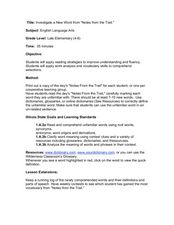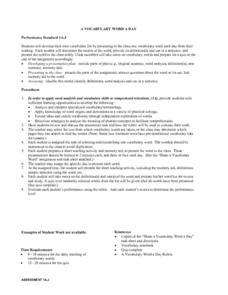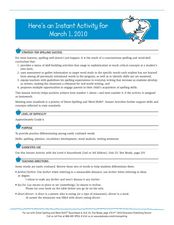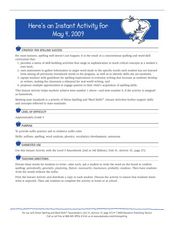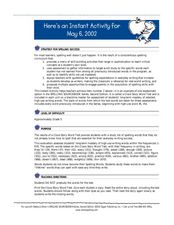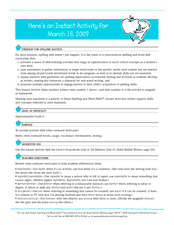Curated OER
Learning to Analyze Characters
Learners discover writing strategies authors use to enhance characters. In this character writing instructional activity, students are read the Knuffle Bunny books by Mo Willems and analyze the story, characters and settings as...
Curated OER
Cool Word Vocabulary
Students practice using new vocabulary by putting a picture with the new word. They also write the definitions of the new words. They use the pictures to create a clue in which others can practice the new words.
Curated OER
The "Write" Stuff: Third Grade Strategies and Conventions
Students analyze the writing process through the ten lessons of this unit. The expository lessons address topic and detail sentences, paragraph organization and development, note taking, reports and letter writing.
Curated OER
Investigate a New Word from "Notes from the Trail"
Students read and take notes from Notes from the Trail. In this reading fluency lesson, students read back and share their notes finding 7-10 new words. Students define, write an unrelated sentence and present.
Beacon Learning Center
Power Words
Using words can create a power struggle! Using antonyms and synonyms can create a Power Words game! Check out this instructional activity that teachers your class the difference between the two and how to use a thesaurus.
Curated OER
Problem Solving: Work Backward
In this working backwards worksheet, students learn to use the problem solving strategy of working backward to solve the six math word problems.
Curated OER
Cool Tools to Solve Challenging Word Problems
Learners solve math word problems. In this cool tools instructional activity, students are introduced to the K-N-W-S method. Learners work in groups and complete a worksheet using this method of learning.
Curated OER
Estimating Solutions to Word Problems
Fourth graders explore number sense by completing word problems in class. In this estimation lesson, 4th graders define terms such as sum, difference, estimate and best. Students complete estimating worksheets based on the concept of...
Curated OER
A Vocabulary Word a Day
Students research one assigned vocabulary word and prepare a short teaching activity and memory aid to present with the word to the class. They take notes on all the new vocabulary words presented to them by other classmates then they...
Curated OER
Practice Easily Confused Words
Sixth graders review vocabulary words. In this spelling lesson, 6th graders review words that are easily confused. Students complete an activity at home for practice.
Curated OER
Word Building with Suffixes
Fifth graders complete a worksheet. In this suffixes instructional activity, 5th graders dictate words, write words and write words without suffixes. Students complete a worksheet where they build words with suffixes.
Curated OER
Words Ending in Soft g
Fifth graders complete a worksheet. In this sound identification lesson plan, 5th graders distinguish between a soft g and a hard g sound and identify words with each. Students complete a worksheet where they write and identify words...
Curated OER
Homophones and Rhyming Words
First graders explore homophones. In this spelling pattern lesson, 1st graders are led through a discussion on homophones and words that rhyme with homophones. The teacher leads the class in sorting these rhyming words based upon their...
Curated OER
Cloze Word Story
Fifth graders complete a cloze word story test. In this listening skills lesson, 5th graders listen to a story and follow along with their own copy. Students listen to the story a second time and fill in the missing words as they go.
Curated OER
Ten Cents a Word
Students recognize the importance of summarizing in this activity. They "sum up" an article about monarch butterflies. Students practice writing summaries of the article charging themselves 10 cents/word. They try to write the least...
Curated OER
Some Words Need Capitals
Fourth graders determine when to use a capital letter. In this spelling lesson, 4th graders discuss which groups of words need a capital letter. Students then apply that knowledge by proofreading a short story and determining which...
Curated OER
Weirdo Words
Sixth graders complete a worksheet. In this spelling lesson, 6th graders test a spelling rule and use it to analyze various words. Students complete a worksheet where they complete words with ie or ei.
Curated OER
Not So Snappy 13- Word Problems
In this word problem worksheet, students problem solve to find the answers to 4 examples. They use a variety of strategies including solve a simpler problem, and using logic in their work.
Curated OER
Must Know Words for Spelling
In this spelling worksheet, students learn key words that are must knows for spelling. There are about three hundred words and cover words from A to Z.
Curated OER
Listen to Grandfather - Say and Write Korean Words
Young scholars create a calligraphy piece using Korean words. They use han'gul script and write with a brush after learning the words. They pay attention to line and space as they create their work of art.
Curated OER
Spelling: ie and ei words
Fourth graders practice spelling "ie" and "ei" words. In this review of spelling, 4th graders discuss different "ie"/"ei" words and the old saying "i before e except after c" and it's accuracy. This lesson includes a worksheet for...
Curated OER
Vocabulary: Often-Confused Word Pairs
Sixth graders practice their word choice. In this vocabulary development lesson plan, 6th graders practice choosing the correct word when given a pair of words that are often confused for each other. this lesson plan includes a worksheet...
Public Schools of North Carolina
Math Stars: A Problem-Solving Newsletter Grade 2
Develop the problem solving skills of your young learners with this collection of math newsletters. Covering a variety of topics ranging from simple arithmetic and number sense to symmetry and graphing, these...
Public Schools of North Carolina
Math Stars: A Problem-Solving Newsletter Grade 1
Keep the skills of your young mathematicians up-to-date with this series of newsletter worksheets. Offering a wide array of basic arithmetic, geometry, and problem solving exercises, this resource is a great way to develop the...





